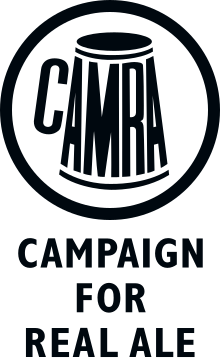CAMRA

Logo of CAMRA
|
|
| Formation | 1971 |
|---|---|
| Type | Consumer organization |
| Headquarters | St. Albans |
| Location |
|
|
Membership
|
185,000 (as of 24 January 2017) |
|
Official language
|
English |
|
National Chairman / Chief Executive
|
Colin Valentine / Tim Page |
| Website | www.camra.org.uk |
The Campaign for Real Ale (CAMRA) is an independent voluntary consumer organisation headquartered in St Albans, England, which promotes real ale, real cider and the traditional British pub. With over 185,000 members, it is now the largest single-issue consumer group in the UK, and is a founding member of the European Beer Consumers Union (EBCU).
The organisation was founded in 1971 in Kruger's bar in Dunquin, Kerry, Ireland by Michael Hardman, Graham Lees, Jim Makin, and Bill Mellor, who were opposed to the growing mass production of beer and the homogenisation of the British brewing industry. The original name was the Campaign for the Revitalisation of Ale. Following the formation of the Campaign and the first AGM at the Rose Inn, Coton Road Nuneaton in 1972 – where early membership records consisted of the four founders and their friends, interest in CAMRA and its objectives spread rapidly, with 5,000 members signed up by the following year. Other early influential members included Christopher Hutt, author of Death of the English Pub, who succeeded Hardman as chairman, Frank Baillie, author of The Beer Drinker's Companion, and later the current Good Beer Guide editor, Roger Protz.
On 31 March 2016, founder Michael Hardman returned to chair a Revitalisation Project Steering Group. The aim of the Revitalisation Project is to review the organisation's purpose. Consultation meetings took place in the spring and summer of 2016, and further discussion will take place at the Bournemouth AGM in spring 2017 leading to possible refinement of proposals then subject to a final vote of all members at spring 2018's AGM.
CAMRA's stated aims are to:
CAMRA's campaigns include promoting small brewing and pub businesses, reforming licensing laws, reducing tax on beer, and stopping continued consolidation among local British brewers. It also makes an effort to promote less common varieties of beer, including stout, porter, and mild, as well as traditional cider and perry.
...
Wikipedia
